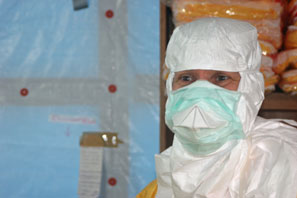
The public-health establishment has unanimously opposed a travel and visa moratorium from Ebola-plagued West African countries to protect the U.S. population. To evaluate whether this opposition rests on purely scientific grounds, it helps to understand the political character of the public-health field. For the last several decades, the profession has been awash in social-justice ideology. Many of its members view racism, sexism, and economic inequality, rather than individual behavior, as the primary drivers of differential health outcomes in the U.S. According to mainstream public-health thinking, publicizing the behavioral choices behind bad health—promiscuous sex, drug use, overeating, or lack of exercise—blames the victim.
The Centers for Disease Control and Prevention’s Healthy Communities Program, for example, focuses on “unfair health differences closely linked with social, economic or environmental disadvantages that adversely affect groups of people.” CDC’s Healthy People 2020 project recognizes that “health inequities are tied to economics, exclusion, and discrimination that prevent groups from accessing resources to live healthy lives,” according to Harvard public-health professor Nancy Krieger. Krieger is herself a magnet for federal funding, which she uses to spread the message about America’s unjust treatment of women, minorities, and the poor. To study the genetic components of health is tantamount to “scientific racism,” in Krieger’s view, since doing so overlooks the “impact of discrimination” on health. And of course the idea of any genetic racial differences is anathema to Krieger and her left-wing colleagues.
Local public-health programs are just as committed to “social justice.” The National Association of County and City Health Officials promoted a seven-part PBS documentary, Unnatural Causes: Is Inequality Making us Sick?, to trigger community dialogues about health equity. NACCHO’s Health Equity and Social Justice initiatives seek to “advance the capacity of local health departments to tackle the root causes of health inequities.”
During the height of the AIDS epidemic, the public-health profession abjured any focus on abstinence as a means of stopping the spread of the disease. This silence was contrary to decades of public-health response to venereal disease, which stressed individual responsibility, as well as contact tracing, to prevent further infections.
The American Journal of Public Health recently published a study coauthored by Columbia University professor and longtime police critic Jeffrey Fagan arguing that young black men who have been stopped and questioned by the New York Police Department suffer from stress and anxiety. The more times an individual gets stopped, Fagan claims, the more stress he may feel. The study did not consider whether individuals who have been stopped numerous times by the police may be anxious because they are gang members operating in a world where retaliatory shootings are common. Nor did it compare the stress of stop subjects with the stress once experienced by law-abiding residents of high-crime neighborhoods before the NYPD brought violent crime down 80 percent.
The public-health profession has a clear political orientation, so it’s quite possible that its opposition to a visa and travel moratorium is influenced as much by belief in America’s responsibility for the postcolonial oppression of Africa, and suspicion of American border enforcement, as it is by a commitment to public-health principles of containment and control. (African countries, unburdened by any such racial guilt, have not hesitated to impose travel bans; Nigeria’s travel restrictions are now being credited for its escape from an Ebola incursion.) To be sure, the logistics of such a moratorium would be challenging, but no more challenging than retrofitting American hospitals for Ebola patients.